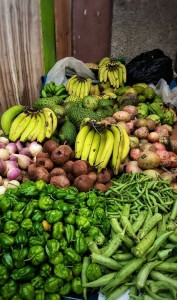Winter in Dhaka is warmer than anticipated. There are hardly anymore wintry days when one would have the pleasure to wake up to the city covered in mist.
In the earliest of the day the sky often drapes a veil of clouds to oust the sun. But none of this ever postpones the morning errands. The newspaper would be delivered exactly at 6 am in the morning and dropped in front of the house just waiting to be picked up. The milkman would carefully leave the two packets of milk over the newspaper. The housewife would have to pick up the paper soon before the drops of cold seeped into the paper and smudged the front-page. Nobody wants to start their day with taunts from the head of the house. They had to make themselves useful; prove the world that they deserved to relish the earning of their husbands.
Monima didn’t sleep last night. She couldn’t actually remember the last time she was woken by her piercing alarm. It was still reasonably dark outside yet she unmistakably heard the street hawkers arranging their shops for the day, the fisherman screaming at the top of his voice taja macch niben taja. If she had not heard that voice for over eighteen years, she never would have understood the words. The words were gibberish and the voice was high pitched to attract customers. Anyone could scream at the fisherman from a balcony or window and have him right at their doorsteps. No one would immediately buy the fish. First the customers would carefully check the fish to see if it is really fresh. If the fish had a soft belly and turned red it must be more than two days old; the spices would never mix properly and the curry would be a disaster. Monima had learned all the tricks as she regularly shopped with her parents: baba and Ma. Her delicate hands could, without any hassle, carry at least thirty pounds of groceries three flights of stairs.
The fragrance of Cardamom and Cinnamon brought her back to reality. The tea stalls had also resumed their business by now. The smell of freshly boiled tea would soon spread around like a wildfire. Tea would be served in small glasses over a tray, often with a piece of toast biscuit, and moved around the stalls. It looked unappealing at first; it was dark but then after a few stirs the tea would take up a lighter layer. The tea is made with milk concentrated into malai with perfect amount of sugar. Whole cinnamon and cardamoms are added with the water which helps to sustain a marvelous aftertaste.
Monima did not mind a walk that early morning. It was still blue outside which meant traffic was almost non-existent and the air was thicker. She put some money in her pockets and headed to get the bag specifically put aside for groceries. She craved for the tea so much that she would even tolerate the occasional obscene glares from the people sitting on the stall and then walk around to buy some groceries. Her Ma was already up and had started working around the house.
“Ma Ami Jacchi, Ashar shomai kichu shobji anbo ne,” Monima whispered to her as she hastily took out the grocery bag from the kitchen cabinet. She let her mother know that she was going out on a walk and would get some vegetables on her way back. Her mother gave her a silent nod as she was chopping the Rui macch for lunch already. On any other day, Monima would have stayed until her mother fried the fish. She loved the sound of the first sizzle of fish on the frying pan. The tantalizing essence of coriander and cumin spread her nostrils with delight. She never tried to help her mother in the kitchen. She had a fear that if she showed any sign of domesticity; she would bear the same fate her mother carries around every day. Monima’s mother never mentioned the concept of marriage to her, neither did she ask for help in the kitchen. But, years of silence and observation nurtured the worst fears for future in Monima and she had not encountered enough hope to get rid of them. Monima enjoyed keeping her life confined to fewer people. She had little pride in the failures of her acquaintances and she never bothered to pry in the windows of her relatives. They had nothing that would give her a moment of relief. Her absence from their life had always been comforting enough to her. In a matter of years, detachment from almost everyone bought her great ease—except her mother.
The streetlights were still lit—a beige spotlight for the mosquitos to gather around. Each street vendor stood under every spotlight with their van filled with freshly picked vegetables and leaves. The market buzzed with freshness and bargain. She kept away from the overwhelmingly smell of the fish section. She knew what groceries she needed but the challenge was to accumulate the freshest goods in the cheapest price. They all knew her. As she walked around the temporary shops, some of them greeted her “Apa bhalo achen?” Others told her which vegetables were best for the day. She picked up the bitter gourds, pumpkins, and eggplants with a scrutinizing look pretending she knew everything about them. She was an adult after all and she had the world to prove that to. Soon her bag was full and her pockets were empty. She had to leave. Monima walked back towards her house with responsibilities in her hand under the dazzling sun; the cravings for tea all forgotten.

